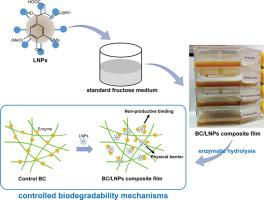Carbohydrate Polymers ( IF 11.2 ) Pub Date : 2021-09-10 , DOI: 10.1016/j.carbpol.2021.118656 Dong Tian 1 , Yujie Guo 1 , Mei Huang 1 , Li Zhao 1 , Shihuai Deng 1 , Ouping Deng 2 , Wei Zhou 2 , Jinguang Hu 3 , Fei Shen 1

|
In practical applications, the full biodegradability of all-biomass-based bacterial cellulose (BC) composites enhances their environmentally friendliness but results in the poor durability especially at humid conditions. This work prepared BC/lignin nanoparticles (LNPs) composite films with retarded biodegradability, which could broaden their application area. Three LNPs were fabricated using technical lignins extracted by deep eutectic solvent (DES), ethanol organosolv, soda/anthraquinone from poplar. LNPs involvement during BC fermentation showed limited influence on its productivity but significantly retarded the biodegradation of composite films. The potential inhibition mechanism was physical barrier and non-productive binding of LNPs. The BC/Soda LNPs showed much higher retarded degradation property (~58 wt% degradation) compared to BC/Organosolv LNPs and BC/DES LNPs (~85 wt% and ~ 97 wt% degradation respectively) at high enzyme loadings of 5 mg g−1 BCE. While at low enzyme loadings of 1 mg g−1 BCE, all these three composite films showed comparable retarded degradation property of ~60 wt%.
中文翻译:

具有延缓生物降解性的细菌纤维素/木质素纳米粒子复合膜
在实际应用中,全生物质基细菌纤维素(BC)复合材料的完全可生物降解性增强了它们的环境友好性,但导致耐久性差,尤其是在潮湿条件下。该工作制备了具有延迟生物降解性的BC/木质素纳米粒子(LNPs)复合薄膜,可以拓宽其应用领域。使用从杨树中通过深共熔溶剂 (DES)、乙醇有机溶剂、苏打/蒽醌提取的技术木质素制造了三种 LNP。LNPs 参与 BC 发酵对其生产力的影响有限,但显着延缓了复合膜的生物降解。潜在的抑制机制是LNPs的物理屏障和非生产性结合。-1 公元前。虽然在 1 mg g -1 BCE 的低酶负载量下,所有这三种复合膜都显示出可比的~60 wt% 的延迟降解性能。



























 京公网安备 11010802027423号
京公网安备 11010802027423号